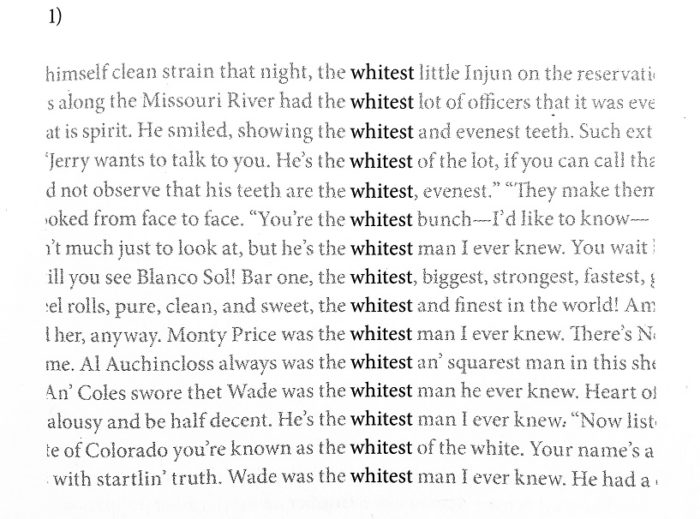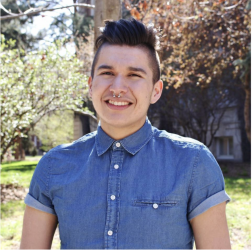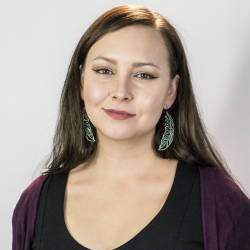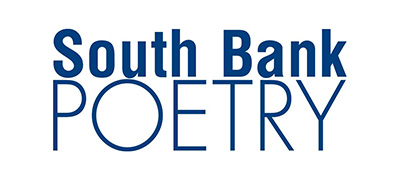TORONTO – Wednesday, June 23, 2021 – Music for the Dead and Resurrected by Valzhyna Mort, (Farrar, Straus and Giroux) and The Dyzgraphxst by Canisia Lubrin (McClelland & Stewart) are the International and Canadian winners of the 2021 Griffin Poetry Prize, each receiving C$65,000 in prize money. The other finalists will be awarded $10,000 each.
Grief After Grief After Grief After Grief
Billy-Ray Belcourt
copyright ©2018
1. my body is a stray bullet. i was made from crossfire. love was her last resort. his mouth, a revolver. I come from four hundred no man’s lands.
2. “smell my armpit again/ i miss it when you do that.”
3. his moaning is an honour song i want to world to.
4. one of the conditions of native life today is survivor’s guilt.
5. it is july 2016 and the creator opens up the sky to attend a #blacklivesmatter protest. there, she bumps into weesageechak and warns him that if policemen don’t stop killing black men she will flood america and it will become a lost country only grieving mothers will know how to find. this, she says, is how the world will end and be rebuilt this time.
6. haunting is a gender. gender is another word for horror story.
7. “i can hear him screaming for me, and i can hear him saying, ‘stop, honey help me.’”
8. i am trying to figure out how to be in the world without wanting it. this, perhaps, is what it means to be native.
2: from Lilting (2014, dir. Hong Khaou).
7: see :h ttp//www.cbc.ca/news/canada/Calgary/rcmp-gleichen-christian-duck-chief-excessive-force-1.3521620
Notes on the Poem
For National Indigenous Peoples Day, our Poem of the Week is “Grief After Grief After Grief After Grief,” by the 2018 Griffin Poetry Prize Canadian winner, Billy-Ray Belcourt from his collection, This Wound is a World (Frontenac House). Of This Wound is a World, the judges said: “Blending the resources of love song and elegy, prayer and manifesto, Billy-Ray Belcourt’s This Wound is a World shows us poetry at its most intimate and politically necessary. Mindful of tangled lineages and the lingering erasures of settler colonialism, Belcourt crafts poems in which “history lays itself bare” – but only as bare as their speaker’s shapeshifting heart. Belcourt pursues original forms with which to chart the constellations of queerness and indigeneity, rebellion and survival, desire and embodiedness these poems so fearlessly explore...This electrifying book reminds us that a poem may live twin lives as incantation and inscription, singing from the untamed margins: “grieve is the name i give to myself / i carve it into the bed frame. / i am make-believe. / this is an archive. / it hurts to be a story.”
The Poetry Kit Spring Competition 2021 Deadline
For more information, follow this link: https://poetrykit.org/PKcomp.htm
This year’s competition is for poetry on any subject. There are no style or length restrictions, but it should be stressed that a short poem is just as likely to be selected as a longer one.
1st prize is £100
2nd prize is £50
ENTER ONLINE: Entry is by email to comps@poetrykit.org after an appropriate fee is paid by Pay Pal to the account of info@poetrykit.org. All entries must be received before midnight MONDAY 21st JUNE 2021
Competition Judge; JIM BENNETT
The Greek Bicentennial Poetry Pamphlet Prizes submission deadline
The Michael Marks Awards for Poetry Pamphlets were established in 2009 and now include four awards and a Poets in Residence program.
The Greek Bicentennial Pamphlet will be a volume of new creative work supported entirely by Marina, Lady Marks, and will form part of the 2021 Michael Marks Awards for Poetry Pamphlets. It will be distributed in the UK, US and Greece, and will be available from December 2021.
The poetry judges are Ruth Padel, David Constantine and Natasha Bershadsky. The illustration judge is Antony Griffiths, and the poetry translator is Haris Psarras.
Billy-Ray Belcourt and Jordan Abel in conversation
A Wake
Liz Howard
copyright ©2016
Your eyes open the night’s slow static at a loss
to explain this place you’ve returned to from above;
cedar along a broken shore, twisting in a wake of fog.
I’ve lived in rooms with others, of no place and no mind
trying to bind a self inside the contagion of words while
your eyes open the night’s slow static. At a loss
to understand all that I cannot say, as if you came
upon the infinite simply by thinking and it was
a shore of broken cedar twisting in a wake of fog.
If I moan from an animal throat it is in hope you
will return to me what I lost learning to speak.
Your eyes open the night’s slow static at a loss
to ever know the true terminus of doubt, the limits of skin.
As long as you hold me I am doubled from without and within:
a wake of fog unbroken, a shore of twisted cedar.
I will press myself into potential, into your breath,
and maybe what was lost will return in sleep once I see
your eyes open into the night’s slow static, at a loss.
Broken on a shore of cedar. We twist in a wake of fog.
Notes on the Poem
This National Indigenous Month, we celebrate voices and poetry that speak to the pluralities of Indigenous identities. Following Jordan Abel, this week’s poem is “A Wake” by the 2016 Griffin Poetry Prize Canadian winner, Liz Howard from Infinite Citizen of the Shaking Tent (McClelland & Stewart), a collection “filled with energy and magic, suspended between competing inheritances, at home in their hyper-modern hybridity” (Judge’s citation). We also invite you to check out Liz Howard’s latest book, Letters in a Bruised Cosmos (2021) (McClelland & Stewart) “Invoking the knowledge histories of Western and Indigenous astrophysical science, Howard takes us on a breakneck river course of radiant and perilous survival in which we are invited to ‘reforge [ourselves] inside tomorrow’s humidex’. Part autobiography, part philosophical puzzlement, part love song, Letters in a Bruised Cosmos is a book that once read will not soon be forgotten.“ Learn more about Infinite Citizen of the Shaking Tent in this Jacket2 interview. Listen to Liz Howard read from her collection for the Griffin Poetry Prize
The Prose Poem – poetry writing class
South Bank Poetry Editor Katherine Lockton runs regular Saturday poetry writing classes online. Join South Bank Poetry for their online programme of poetry writing classes, which provide a fun, personal and accessible approach to learning how to write poetry, in a friendly environment that puts the student’s learning experience first.
This class focuses on the origins of prose poetry.
RBC Bronwen Wallace Award for Emerging Writers winners revealed
Established in memory of writer Bronwen Wallace, this award has a proven track record of helping talented developing authors get their first book deal. Two $10,000 prizes will be given for outstanding works of unpublished poetry and short fiction.
The prize is sponsored by Royal Bank of Canada. Due to the pandemic, the winners will be announced via a digital event in June.
1)
Jordan Abel
copyright ©2016 Jordan Abel

Notes on the Poem
Our Poem of the Week comes from Jordan Abel’s third book of poetry, Injun (Talonbooks) Canadian winner of the 2017 Griffin Poetry Prize. Composed of found texts excerpted from western novels published between 1840 and 1950, Injun displays, through various poetic tools and techniques such as cut-up, pastiche, erasure, and visual poetry, the anti-Indigenous racism permeating Western discourse and literature. Structured around five sections, “Injun,” “Notes,” “Appendix,” “Sources,” and “Process,” Abel subversively re-appropriates academic conventions, diverting their function and troubling their authority. In this visual poem, found in the “Notes” section of the book, we see a stacked repetition of the word “whitest”—a linguistic technique known as concordance line. Abel’s found lines, when collaged together, unsettle and force the reader to confront whiteness and Indigenous erasure head on. As Amaranth Borsuk and Sarah Dowling note, “the transformations Abel enacts upon his source texts mirror the violence settlers enact upon Indigenous societies, but his book’s insistent contemporaneity and vitality—indeed, its beauty and lyricism—demonstrate the myriad ways in which Indigenous peoples persist and endure." We also invite you to also check out Abel’s newly released memoir, NISHGA (McClelland & Stewart) a groundbreaking autobiographical work that collages poetry, art, and archival documents to speak “about intergenerational trauma, Indigenous dispossession, and the afterlife of residential schools.” (Abel, CBC, 2021)
Jordan Abel launching Nishga, in conversation with Ian Williams
Find the book here: https://bit.ly/2Pyb1ML
More info on their webstore here:
http://mtl.drawnandquarterly.com/posts/webstore-faq
As a Nisga’a writer, Jordan Abel often finds himself in a position where he is asked to explain his relationship to Nisga’a language, Nisga’a community, and Nisga’a cultural knowledge. However, as an intergenerational survivor of residential school–both of his grandparents attended the same residential school–his relationship to his own Indigenous identity is complicated to say the least.





